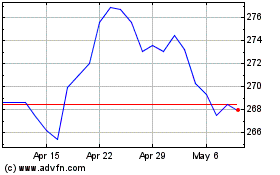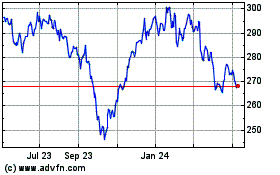By Thomas Grove
MOSCOW-- McDonald's Corp. became a leading ambassador of
American culture after opening its first restaurant here in the
twilight of the Soviet Union. Now, as Russia-U.S. tensions rise and
pro-Kremlin politicians call repeatedly to close the U.S. chain,
management is taking a new tack: Go Russian.
Earlier this year, the company boosted the share of Russian
suppliers its restaurants use to 98%, and it has embarked on a
marketing campaign to drive home the point that in Russia
McDonald's doesn't have to be an American company.
"People are only now starting to understand: We're one of the
most Russian companies there is," Moscow-based McDonald's
spokeswoman Elena Chilingaryan said.
McDonald's has succeeded world-wide in part by finding local
suppliers wherever its restaurants operate, shortening supply
chains and insulating against foreign-exchange volatility. But as
tensions between Washington and Moscow rise, the company is finding
that strategy can ease political pressures as well.
"McDonald's has remained profitable here and weathered the storm
in geopolitics by going local," said Narek Avakyan, chief financial
officer at Moscow-based consulting company Alliskit.
The local focus appears to be paying off. The number of
McDonald's restaurants in Russia grew 6% year-over-year last
quarter, well above the global average of 1.5%. And while Russian
outlets only account for a fraction of McDonald's world-wide total,
the company still sees Russia as a high-growth market able to
offset saturated markets like the U.S. A large majority of
McDonald's restaurants in Russia are company-owned.
"Even though it's an emerging market, over time Russia's been
pretty good to McDonald's," said Sara Senatore, senior analyst for
U.S. restaurants at Bernstein Research.
The company opened its first restaurant down the street from the
Kremlin on Pushkin Square in 1990, where it served 30,000 hungry
Soviet Muscovites on its first day. But deteriorating ties over the
past several years between Moscow and Washington has made
McDonald's a target for Russian authorities seeking retaliation
against successive waves of U.S. sanctions.
U.S.-Russian ties have frayed in recent years to their worst
condition since the fall of the Soviet Union. Washington has
applied numerous rounds of sanctions in retaliation for Russia's
political and military actions in Ukraine, its meddling in the 2016
presidential election and its involvement in poisoning a former
Russian spy.
The first shots against McDonald's were fired in 2014 after the
U.S. sanctioned Russia following Moscow's annexation of Crimea.
Russian authorities at the time closed a dozen restaurants
nationwide, including the Moscow flagship, and subjected hundreds
of others to snap health inspections. Calls to close the chain have
continued, most recently during regional elections last
September.
The temporary closures had little effect on sales that year,
analysts said, but management used them as an opportunity to
refurbish restaurant interiors and start digitizing internal
processes, said Roman Bezdudny, a former regional marketing
manager. McDonald's says it regularly carries out modernization and
that it wasn't necessarily planned.
McDonald's didn't respond to requests for comment about other
aspects of its sourcing and marketing.
After that experience, McDonald's focused on boosting purchases
from local producers for almost everything it served, from bacon to
fish sticks, according to information the company has published.
Earlier this year, McDonald's signed a contract to buy its french
fries from a Russian producer--a first in its almost 30-year
history. The french fry factory is expected to reach full capacity
next year.
The agreement ends one of McDonald's most fraught endeavors
here: finding the right supplier to reliably deliver the iconic
golden fries up to the standards the company expects, former
employees said.
"No one could get the french fries right, to get that golden
crisp that it took years to perfect," Mr. Bezdudny said.
Russian company Belaya Dacha, which built the potato processing
plant in the Lipetsk region together with Dutch company Lamb
Weston/Meijer, is teaching farmers how to produce according to the
standards and quantities McDonald's needs.
And McDonald's advertising strategy is focused on getting the
word out. Delivery trucks are painted with a large "98%,"
signifying the company's share of local suppliers. A commercial
produced earlier this year showed Russian farmers picking through
crops as the voice-over says: "When it's about food, you choose
what's close, what's native."
Some restaurants have brought in cutouts of the farmers
producing tomatoes, lettuce and cucumbers to reinforce the
point.
McDonald's success contrasts with Russia's most recognizable
fast food brand Teremok, known in Russia for its blini, or crepes,
heaping with caviar, sour cream or ham and cheese. The company,
which touts its Russian roots, ventured into the U.S. market in
2016 and withdrew earlier this year.
Teremok's general director Mikhail Goncharov said the company
had come up against "open hostility" in the U.S. market with health
inspections and questions over its ties to Russian President
Vladimir Putin.
Meantime, McDonald's seems unlikely to escape the ire of Russian
politicians soon. Earlier this year, a lawmaker in the lower house
of parliament, or Duma, and a member of the committee for health
protection wondered aloud why Russia doesn't sanction American
companies.
"Americans are laying the sanctions on," Nikolai Gerasimenko
told Russian state broadcaster RT. "Why can't we impose sanctions
on the purchase of McDonald's?"
Write to Thomas Grove at thomas.grove@wsj.com
(END) Dow Jones Newswires
November 08, 2018 07:14 ET (12:14 GMT)
Copyright (c) 2018 Dow Jones & Company, Inc.
McDonalds (NYSE:MCD)
Historical Stock Chart
From Apr 2024 to May 2024

McDonalds (NYSE:MCD)
Historical Stock Chart
From May 2023 to May 2024
